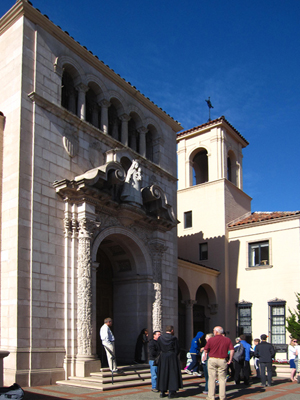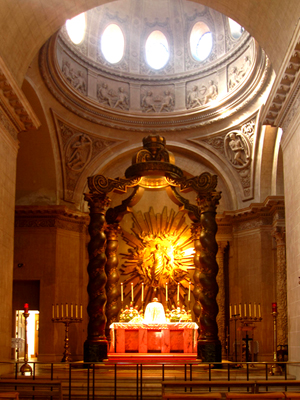| |
 |
 |
 |
| Comment on this report, or find other reports. |
 |
| Our Mystery Worshippers are volunteers who warm church pews for us around the world. If you'd like to become a Mystery Worshipper, start here. |
 |
| Find out how to reproduce this report in your church magazine or website. |
|
|
| 2654: Carmelite
Monastery of Cristo Rey, San Francisco, California, USA |
 |
 |
 |
Mystery
Worshipper: Ebenezer.
The church:
Carmelite
Monastery of Cristo Rey, San Francisco, California, USA.
Denomination:
Roman Catholic,
Archdiocese
of San Francisco.
The building:
The chapel in which the service was held constitutes about 20
per cent of the monastery compound. The compound was built in
1927 and exemplifies the Spanish Revival architecture common
to the 1920s. The chapel itself is much more ornate, featuring
heavily carved stone columns and other details. Itís the most
beautiful church Iíve ever been in. Above the altar is a baldachin
with Solomonic columns, reminiscent of the one in St Peterís
Basilica in Rome and well-proportioned for a smaller chapel.
On the wall behind the altar is a sculpture in high relief of
a windswept Jesus with outstretched arms in front of a golden
aureola and accompanied by putti (representations of chubby
male babies, often confused with cherubim). Ringing the dome
in the ceiling above the altar are more putti with almost fierce
expressions, holding hands and cherishing various symbols of
the faith. Some less ethereal painted statues are also placed
around the chapel but do not affect the atmosphere much.
The church:
The twenty Carmelite nuns of the Monastery of Cristo Rey are
cloistered and lead a secluded life of prayer, contemplation
and penance. They abstain from meat year-round and do not leave
the monastery compound except for medical treatment. They alternate
praying the divine office in English and Spanish, as they are
bilingual due to their history. The community was originally
founded in Guadalajara, Mexico in 1695, and relocated to California
in 1927 as a result of religious persecution. In more recent
years they merged with the Carmelites from a monastery in Kensington,
California, which closed.
The neighborhood:
The monastery is located near the northeast corner of Golden
Gate Park and adjacent to the University of San Francisco, a
Jesuit school. Itís a beautiful neighborhood and, like about
half of San Francisco, is up a hill.
The cast: The chapel is not a parish and does not have a regular priest. When I approached the visiting celebrant after the service, by way of explaining the reason for some of my questions (and why I was taking notes), I told him I was writing up my experience for a post. He was anxious about having his name posted online, despite my reassurances, so I agreed not to record it.
The date & time:
Saturday, January 25, 2014, 10.00 am.
What was the name of the service?
Extraordinary Form Latin High Mass. It was advertised in association
with the Walk
for Life West Coast, an annual pro-life protest in San Francisco.
Iím not sure how frequently public services are held in the
chapel.
How full was the building?
There were about 60 people in attendance, and 144 chairs, so
about 40 per cent full. Some in attendance were in town for
the Walk for Life, and some were local. A majority of the women
wore mantillas. We could not see the nuns, as they were behind
a grille in the right wing of the chapel.
Did anyone welcome you personally?
On the walk up to the chapel, I met a student group from a university
in Californiaís Central Valley who were also there for the Walk
for Life. We chatted during the walk and sat together. I did
not encounter any ushers or other staff, and no information
was handed out about the service.
Was your pew comfortable?
We sat on padded wooden chairs with individual kneelers. They were about as comfortable as a padded pew, but there was more kneeling than I was used to, and the padding was not up to the task.
How would you describe the pre-service
atmosphere?
Because most everyone was visiting, the atmosphere was rather unsure. Between being breathless from the walk and awestruck at the interior, I did not feel settled in for several minutes and was glad the service started late. The organ played quietly during this time.
What were the exact opening words of the
service?
The first words of the service were sung by the choir in indecipherable
Latin. The first spoken words were whispered by the priest in
Latin, facing the altar. The first audible spoken words were
"Gloria in excelsis Deo."
What books did the congregation use during the
service?
No materials were provided for the congregation. I saw one person
who had brought what looked like a personal missal. Not much
participation was expected from the congregation; our responses
were mostly limited to "Et cum spiritu tuo."
It felt more like we were witnessing the priestís devotions
than participating in the mass ourselves. I found the rest of
the Latin hard to follow because of the echoing acoustics, and
at times wished for a printed guide. At other times, I felt
like that would have taken away from the immersive and mysterious
feel of the service.
What musical instruments were played?
They have a two-manual electronic Allen
Renaissanceô Chapel Organ, System C-6c, which accompanied
two choirs: one, the schola of the Immaculate Heart of Mary
Oratory, visiting from San Jose, California; the other, the
Carmelite nuns in the right wing of the chapel.
Did anything distract you?
Several babies cooed and fretted in the back of the chapel, but the acoustics of the chapel made their exclamations sound surprisingly resonant and lofty, even pleasant. What was more distracting was rubbing shoulders with my neighbors, since the chairs were only 16 inches wide and placed with no space in between.

Was the worship stiff-upper-lip, happy clappy, or
what?
Most of the liturgy was chanted well by the priest in Latin.
The choirs sang mostly plainchant, with the addition of two
Renaissance polyphony pieces by the visiting schola. One of
those was O Magnum Mysterium by Tomas Luis de Victoria,
1572. They did a fine job and were aided by the acoustics of
the chapel.
Exactly how long was the sermon?
8 minutes.
On a scale of 1-10, how
good was the preacher?
9 – The homily revolved around a single gem of a concept.
Mystery Father got straight to the point in a humble, unassuming
style devoid of rhetorical flourishes. I found this insightful
homily to be novel and profound. This kind of metaphorical connection,
borne no doubt from contemplation, is something I find the Catholic
tradition to be rich in. The echoing acoustics made it hard
to understand many of his sentences, though. Speaking very slowly
would have ameliorated the echo.
In a nutshell, what was
the sermon about?
As the soul animates the body, so Godís grace animates our souls.
While it is important to choose life in the sense that all of
us there for the Walk for Life had on our minds, it is also
important that we choose, pursue, fight for, and cherish the
life of Godís grace in our souls.
Which part of the service was like being in
heaven?
The architecture and art conveyed massive, bright, roiling,
yet balanced splendor in a manner Iíve seldom seen. The angelic
images and foreign language were a reminder of the expansive
population of Godís creation. It brought to mind the title Lord
of Hosts and the reality of the doxology: "Praise him,
all creatures here below; praise him above, ye heavenly host."
The carved figures and lofty ceiling gave a sense of humanityís
highest efforts at art and civilization professing the holiness
and sovereignty of God.
And which part was like being in... er... the other place?
As the priest lifted up each of the elements during the mass,
an altar boy kneeling beside the priest simultaneously lifted
up the back of the priestís chasuble, while a second altar boy
censed them and a third rang the altar bells. I understand that
this lifting of the chasuble is done to relieve the weight of
the vestment from the priest's shoulders so that he may elevate
the elements to the maximum height, but it looked embarrassing
and distracted visually.
What happened when you hung around after the service looking lost?
Many of the attendees gathered outside the door and chatted
with each other. I talked with a lone Byzantine Rite monk whom
I initially mistook for being associated with the monastery.
Eventually the priest appeared and I asked him a few questions,
but it was clear that he was a visitor just as much as the rest
of us.
How would you describe the after-service
coffee?
There were no after-service refreshments.
How would you feel about making this church your regular (where 10 = ecstatic, 0 = terminal)?
1 – This was my first time at a Latin mass. At first I
didnít enjoy the Latin, but it definitely grew on me. Still,
for a regular thing, I would benefit from more intelligible
and participatory worship. If this were a parish with regular
such services and I had to attend, I would bring an interlinear
missal and be quick to learn it.
Did the service make you feel glad to be a
Christian?
Oh, yes. Thereís nothing like the strong sense that all of creation is praising and glorifying God for feeling happy that you are too.
What one thing will you remember about all this in seven days' time?
The sculpted relief behind the altar, of Jesus looking so active and welcoming at the same time. |
|
|
 |
 |
 |
| We rely on voluntary donations to stay online. If you're a regular visitor to Ship of Fools, please consider supporting us. |
 |
 |
 |
| The Mystery Pilgrim |
 |
| One of our most seasoned reporters makes the Camino pilgrimage to Santiago de Compostela in Spain. Read here. |
 |
 |
 |
| London churches |
 |
| Read reports from 70 London churches, visited by a small army of Mystery Worshippers on one single Sunday. Read here. |
| |
|
|
|
|


